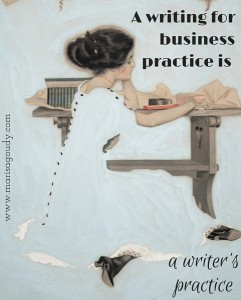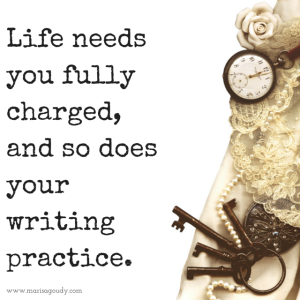
BLOG
A Writing-for-Business Practice is a Writer’s Practice
Sovereign Standard, Issue 28 An editorial calendar is nothing; a writer’s practice is everything.
An editorial calendar is nothing; a writer’s practice is everything.
I kind of stole that from Ike.
 “Plans are nothing; planning is everything.”
“Plans are nothing; planning is everything.”
President Eisenhower was likely talking about the planning process required for taking a beachhead or running a country, but his statement encouraged me to think about blogging and writing for your business in a new way.
[tweetthis]Making a plan for your #blog is nothing. The #writing process is everything.[/tweetthis]
Making a plan for your blog is useless. The writing process is everything... When the coaching industry exists to sell you strategies and organization tips, this sounds like heresy, but editorial calendars are meaningless to me - and I bet they’re pretty useless to you too.
Forget editorial calendars. Writing is sustained by practice (and, well, writing).
I write and support writers for a living, but I have never had an editorial calendar.
[tweetthis]An editorial calendar is nothing; a writer’s practice is everything.[/tweetthis]
I’ve started plenty of spreadsheets called “editorial calendar.” I’ve listed publication target dates on the left side and created columns with important headers like “title,” “category,” and “call to action.”
And then… I’ve never gotten past the first entry. Six months later, inspired by advice I’ve given to my own clients, I try all over again (sometimes I even remember to just copy and past the old, useless calendar).
Invariably, however, I fall back into my old “no-plan plan.” And the writing still gets done.
Why do I do it this way? Because it works.
Does it work because I’m a born writer who thrives on chaos rather than organization?
Nope.
It works because I’m dedicated to my writing-for-business practice. And it’s not the sort of practice that you can outline in marathon sessions every few months.
The writing-for-business process is the very process of being a business owner, a thinker, and a writer. And it happens in its own time, according to what you’re learning and how you’re growing in real time.
What is a Writing-for-Business Practice?
To be a professional who writes to support your business, you have to sit down and put words on a page - but it’s about so much more than that.
To have a real writing practice that works, that actually supports and furthers your professional goals, you need to invest yourself in the entire process from generating and channeling ideas to publishing and sharing your content.
You don’t need to follow anyone’s specific framework or keep track of your progress according to any set form, but you do need to understand your own process well enough to replicate what works so you can publish according to your own schedule, week in and week out.
5 Key Elements of a Business Visionary's Writing Practice
This list isn’t exhaustive. The writing practice - even when it’s for business rather than pure creative expression - it’s a fiercely personal endeavor. You can make it as simple or as complex as as you are.
After five years of writing my own professional posts and helping many clients develop theirs, here’s a bit of what I know must be part of your practice:
- Curiosity - You look for the layers of the meaning in the every day.
- Storytelling - You see the potential plot lines, themes, and characters in your seemingly mundane experiences.
- Dedication - You show up to write regularly, even when life and “real” work want to get in the way.
- Tenacity - You keep writing and publishing even when no one seems to be listening (keep at it, produce well-made, fascinating content and, eventually, people will read, share, and take action).
- A recognition that writing is its own reward (at least at first) - The process sustains you and you’re able to see the benefit in organizing your thoughts and becoming a stronger writer - even before the loyal following shows up.
The Writing-for-Business Routine
Above, I say that the writing-for-business practice happens in its own time. That’s true, but in order for it to be a practice, it has to have a reliable enough rhythm.
Here’s the flow of my writing routine when it comes to producing weekly blogs:
- take notes consistently (the notebook goes everywhere and scraps of ideas get written down because there’s no telling what will grow into something big and important)
- draft the post on Tuesday and Wednesday
- edit on Thursday
- format and schedule it in WordPress before bed on Thursday night
- read it all over just once more just before it goes live on Friday morning
One writer’s process is just that - one writer’s process. I wouldn’t assume to tell you this is the best schedule to follow.
My weekly process shows you that even though I am free of the editorial calendar, I am not without discipline and commitment. You may not be planning your writing weeks and months in advance, but you are planning to write every week.
Another important thing to note as you settle into a writing routine: give yourself time between “that would make a great blog post” and clicking publish.
Time heals wounds and it also exposes faults in logic, boring storylines, and egregious typos. You need some distance from your writing to see your blind spots, so don’t try to go from start to finish in one session.
A writing-for-business practice is a writer’s practice
 Gone are the days of the elitist “real writer.” There's no need to play the artist or the intellectual who separates herself from the hack and the profiteer.
Gone are the days of the elitist “real writer.” There's no need to play the artist or the intellectual who separates herself from the hack and the profiteer.
When you go to practice, you expect to see a coach there
I don't generally do sports metaphors when I talk about my writing coaching. (If you're the kid whose single basket during middle school YMCA basketball is still a point of pride for your poor dad, the coach, you'd avoid talking about sports too.)
And yet, as I talk about the importance of practice and the longterm commitments and implications of such a practice, it does feel like I'm asking you to get better at playing a game. And in order to really hone your skills, you want a guide and an ally to teach you new skills and refine your own natural abilities. You want a coach.
I would love to support you and help you discover a writing-for-business practice that you can sustain and that can sustain your business.
And if you’re someone who thrives on spreadsheets and long term visioning, I can even help you create and maintain an editorial calendar (just don’t ever ask to look at mine!).
Consider what the Sovereign Standard Writing Coaching Program can do for you.
5 Steps to Reclaiming Your Writing Practice
The Sovereign Standard, Issue 8 
A creative entrepreneur’s editorial calendar can be her salvation. Making a commitment to generate ideas, get the writing done, and put something in front of an audience signals to your community (and your brain and your spirit) that you’re fully invested in this work.
 But, then again, a writing plan can just be a spreadsheet full of punishment and guilt. If you can’t seem to work the plan and meet your deadlines, does it mean you don’t truly care about your business or the people you serve?
But, then again, a writing plan can just be a spreadsheet full of punishment and guilt. If you can’t seem to work the plan and meet your deadlines, does it mean you don’t truly care about your business or the people you serve?
Of course not. But when you’re blinded by the glare of the blank page or find every idea fizzles after two paragraphs, you start to panic. Especially when you’ve been on a consistent publishing streak.
You're thinking nothing short of a natural disaster should stop you from posting on schedule, but here you are, about to fail because you can’t find and stick to one halfway decent topic on an average Tuesday.
Step 1 for Reclaiming Your Writing Practice: Set Your Information Filters
The problem isn’t a lack of ideas. Most likely, it's an overabundance of information and possibility that has you stuck.
So, the first thing to do to vanquish writer’s block is to practice discernment about what sort of information you consume.
In Relax, Their Blogging and Marketing Advice Doesn’t Apply to You I offer a case for why you can tune out what the majority of experts have to say about content marketing - even if you’re dedicated to writing a blog in support of your business.
But then, once you’ve shut off the information fire hose, you’re left with the paradox: now that I finally have some quiet around here, I’m just going to add to the noise.
Step 2 for Reclaiming Your Writing Practice: Believe In the Writing Process
Is the ultimate cure for writer’s block simply killing the urge to write?
What if you convince yourself that producing more articles just adds to the chaos of the oversaturated digital stream? Then you can just walk away from the whole writing enterprise and congratulate yourself for reducing the information glut, right?
No. That’s not right.
There is no greater agony than bearing an untold story inside of you.
- Maya Angelou
Writing is medicine. Words want to make alchemists of us all.
To shape your flashes of insight and prayers of gratitude and revelations of joy into a message that someone else can understand… that is the great prize of the human intellect, the greatest expression of aliveness in this Age of Information.
Writing has saved your sanity more times than you can count, but you forget this. I forget this. And so we research a little more in order to avoid taking the cure that is just as bitter as the disease.
Why is it that when it's time to write we open Google Search instead of opening a Google Doc?
Step 3 for Reclaiming Your Writing Practice: Avoid Writing By Reading About Writing
 Proving that we need writing to sustain us, when I didn't want to write this week, I began to read.
Proving that we need writing to sustain us, when I didn't want to write this week, I began to read.
Writer's block isn't hard to cure. Just write poorly. Continue to write poorly, in public, until you can write better.
He’s right, of course, but the path to success he describes is outlined in traffic cones. Like me, I am betting you were hoping for velvet ropes or a seashell strewn path.
So turn to Kelly Galea who offers the same idea but prepares you a soft writer’s nest with the perfect writing implement and a beloved journal.
Just express yourself. Just BE. So simple, really. Again, are you wondering where these thoughts and words are coming from? This pen. How is that for an answer? The pen is an instrument … YOU are an instrument. Be used to express this collective consciousness in YOUR voice – your unique voice, the voice someone (MANY someones) are waiting to hear, to call them forth, to bring them home. Lead them, guide them, help them, inspire them, teach them. Give them hope. Give them love. Give them that spark. Give them compassion for themselves.
Kelly got me cozy, but I might just burrow into that nest she crafted with her words and never write a thing, so I look to Jeffrey Davis to get me moving.
In Jeffrey’s Post Ecstasy Laundry List he addresses the inevitable come down after a peak creative experience, but much of this advice applies to you if you can’t imagine feeling creative ever again.
He’s telling you to keep writing too:
Make mistakes. The only catastrophic choice a writer makes is not to choose. Whether it’s genre or working story arc or angle. Show up. Get messy. Hit dead ends. Flounder. That’s part of the quest.
Step 4 for Reclaiming Your Writing Practice: Assimilate Rather than Create
I allowed myself one more click before I told myself I would just walk away from the desk and pray for inspiration over the next diaper change (after all, it’s in moments of rest and boredom that the real answers flow).
Then I discovered Karen Brody’s work. Great goodness! She’s an expert in the struggle exhausted, depleted women who inspires you to change your way of being: “Because your life needs you fully charged.”
 Life needs you fully charged, and so does your writing practice. Addressing writer’s block by staring at the page is like passing someone a Kleenex to cure grief.
Life needs you fully charged, and so does your writing practice. Addressing writer’s block by staring at the page is like passing someone a Kleenex to cure grief.
Karen offers 9 insights into the art of being well-rested, and it's barely a stretch to apply each of these to the “I have no idea what to write” lament. My favorite:
Welcome Everything. Think of all the hours you live in an either/or mentality. Real transformation comes when you can drop the false idea that you’re separate.
Apply this approach to your daily life, welcoming every experience as a potential inspiration for your next blog post or article.
Step 5 for Reclaiming Your Writing Practice: Practice Compassion
Bless you and your commitment. All hail your editorial calendar that can. You keep rocking that publishing streak.
But remember that your writing practice is meant to give back to you.
The hours you put in aren’t just in service to another post, another snack for the voracious internet marketing beast.
Your next post is a distillation of your presence in your life and in your business. It is a message from the heart of your work to the heart of someone who needs your wisdom, encouragement, or strategic advice.
The people who matter - the people who want to be beguiled and convinced and changed by your words - they don’t want you to look at a blank page gone blurry with tears of frustration. If they must, they can wait til next week.
And so can your spreadsheet.
But before you give up and beat yourself up:
- tune out the extraneous noise
- remember why writing matters to you
- seek wise counsel
- be present in the moment, and
- be kind to yourself
I can’t wait to read what you'll write next!
This post was sent to Sovereign Standard subscribers first. To join our community of readers and contributors, please subscribe here.
